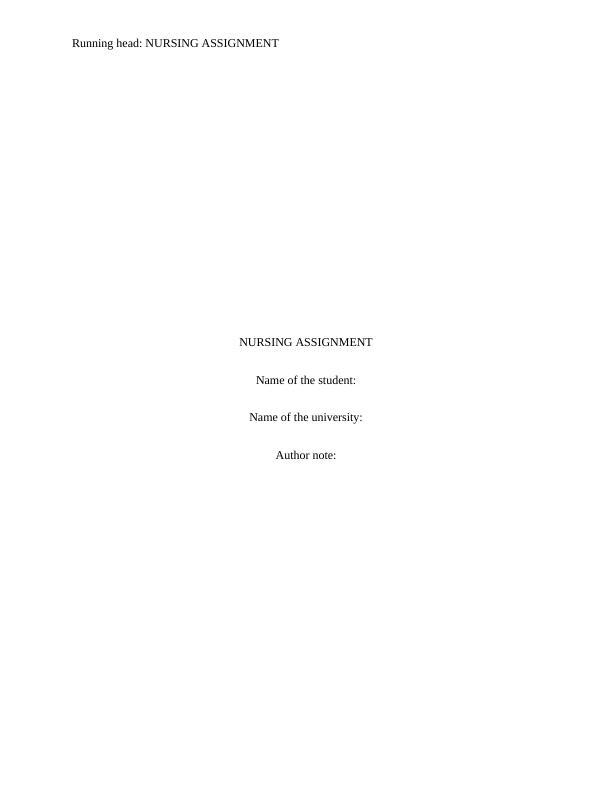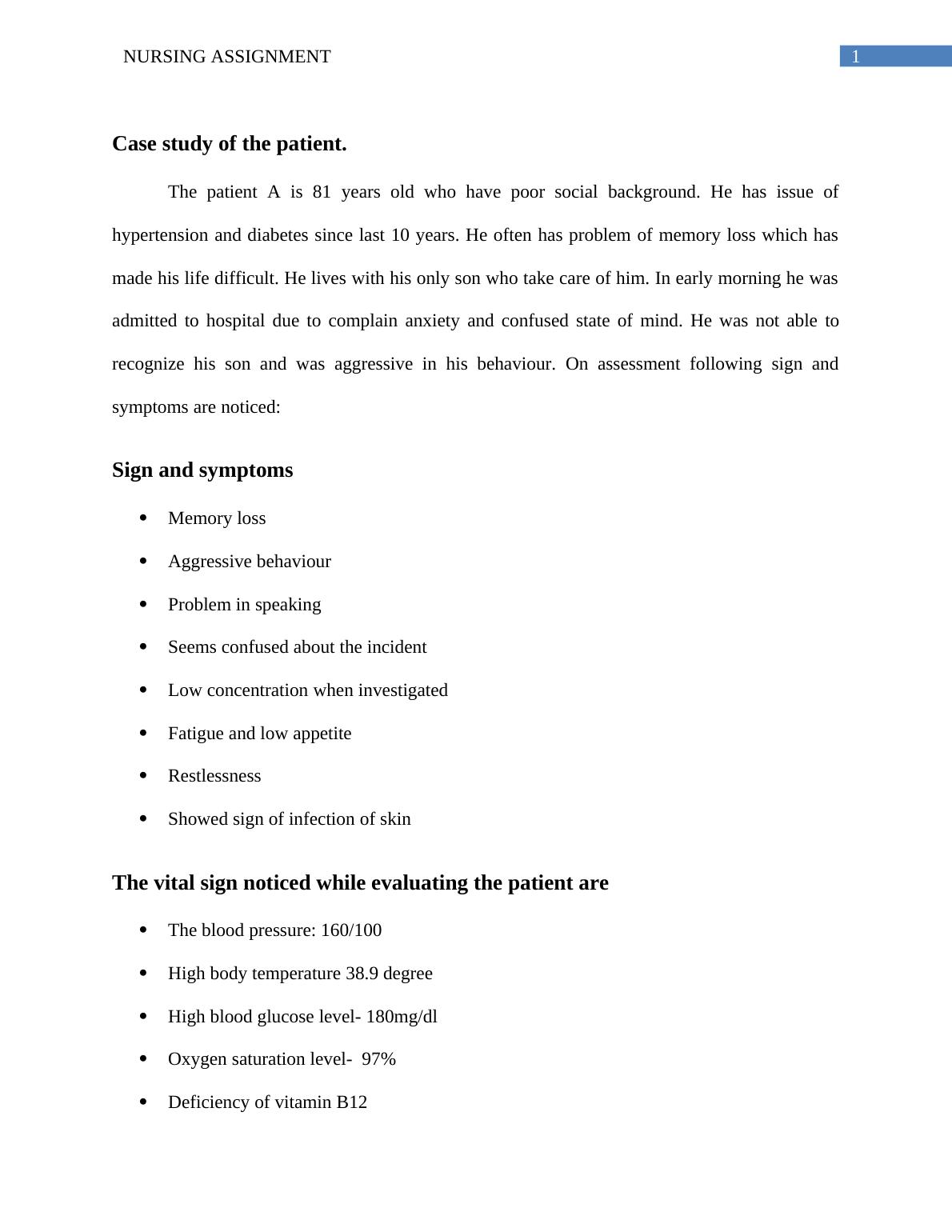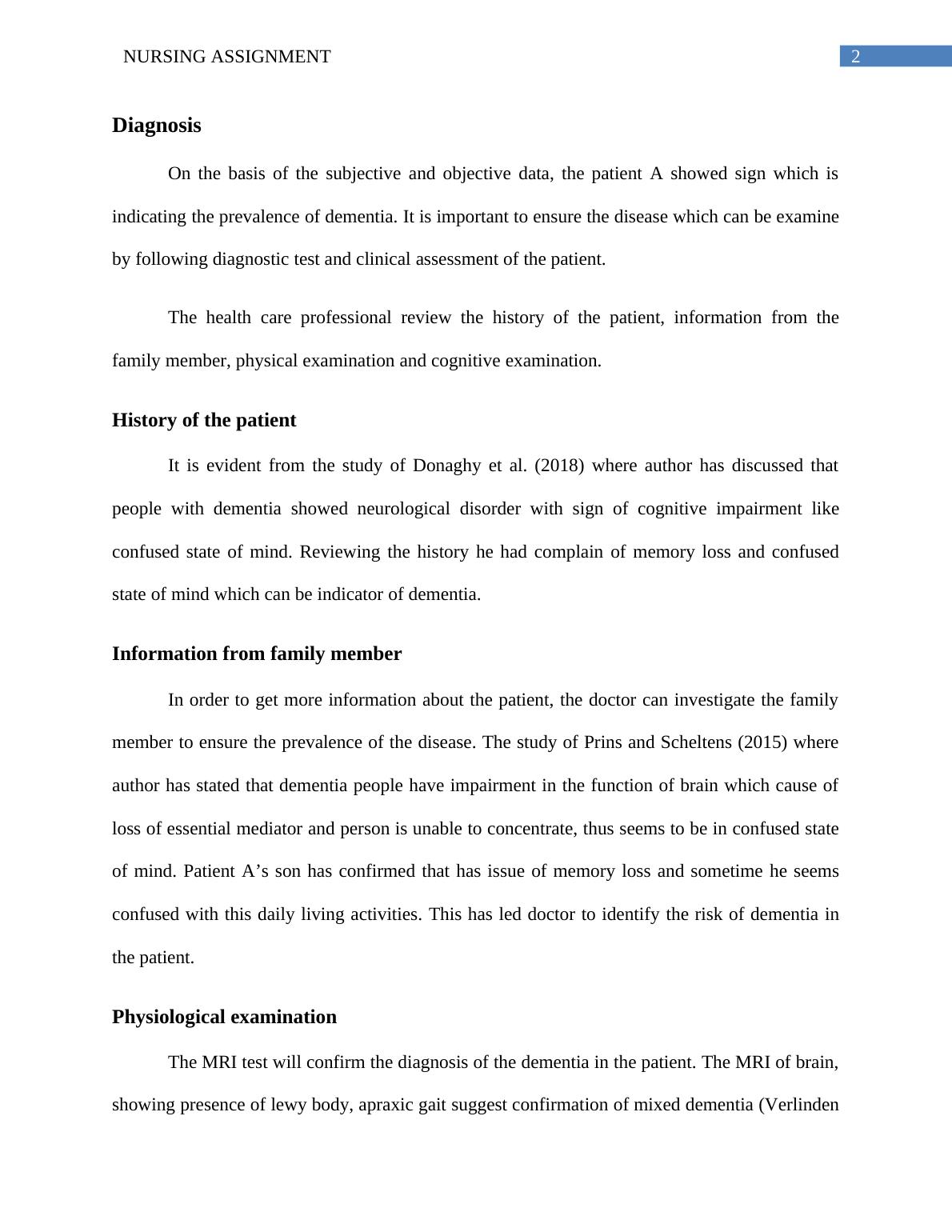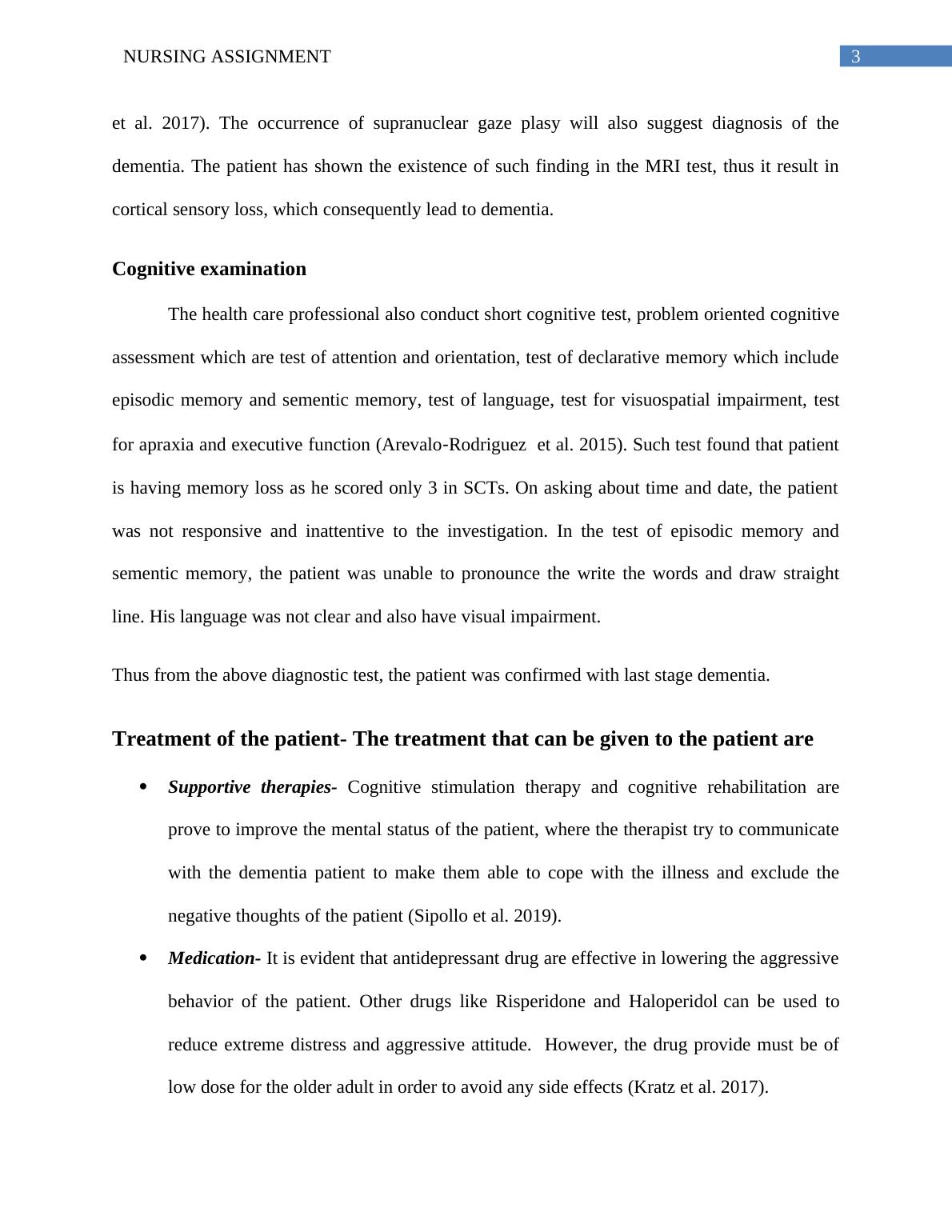Case Study of The Patient Assignment
Added on 2022-09-17
12 Pages3233 Words28 Views
Running head: NURSING ASSIGNMENT
NURSING ASSIGNMENT
Name of the student:
Name of the university:
Author note:
NURSING ASSIGNMENT
Name of the student:
Name of the university:
Author note:

NURSING ASSIGNMENT1
Case study of the patient.
The patient A is 81 years old who have poor social background. He has issue of
hypertension and diabetes since last 10 years. He often has problem of memory loss which has
made his life difficult. He lives with his only son who take care of him. In early morning he was
admitted to hospital due to complain anxiety and confused state of mind. He was not able to
recognize his son and was aggressive in his behaviour. On assessment following sign and
symptoms are noticed:
Sign and symptoms
Memory loss
Aggressive behaviour
Problem in speaking
Seems confused about the incident
Low concentration when investigated
Fatigue and low appetite
Restlessness
Showed sign of infection of skin
The vital sign noticed while evaluating the patient are
The blood pressure: 160/100
High body temperature 38.9 degree
High blood glucose level- 180mg/dl
Oxygen saturation level- 97%
Deficiency of vitamin B12
Case study of the patient.
The patient A is 81 years old who have poor social background. He has issue of
hypertension and diabetes since last 10 years. He often has problem of memory loss which has
made his life difficult. He lives with his only son who take care of him. In early morning he was
admitted to hospital due to complain anxiety and confused state of mind. He was not able to
recognize his son and was aggressive in his behaviour. On assessment following sign and
symptoms are noticed:
Sign and symptoms
Memory loss
Aggressive behaviour
Problem in speaking
Seems confused about the incident
Low concentration when investigated
Fatigue and low appetite
Restlessness
Showed sign of infection of skin
The vital sign noticed while evaluating the patient are
The blood pressure: 160/100
High body temperature 38.9 degree
High blood glucose level- 180mg/dl
Oxygen saturation level- 97%
Deficiency of vitamin B12

NURSING ASSIGNMENT2
Diagnosis
On the basis of the subjective and objective data, the patient A showed sign which is
indicating the prevalence of dementia. It is important to ensure the disease which can be examine
by following diagnostic test and clinical assessment of the patient.
The health care professional review the history of the patient, information from the
family member, physical examination and cognitive examination.
History of the patient
It is evident from the study of Donaghy et al. (2018) where author has discussed that
people with dementia showed neurological disorder with sign of cognitive impairment like
confused state of mind. Reviewing the history he had complain of memory loss and confused
state of mind which can be indicator of dementia.
Information from family member
In order to get more information about the patient, the doctor can investigate the family
member to ensure the prevalence of the disease. The study of Prins and Scheltens (2015) where
author has stated that dementia people have impairment in the function of brain which cause of
loss of essential mediator and person is unable to concentrate, thus seems to be in confused state
of mind. Patient A’s son has confirmed that has issue of memory loss and sometime he seems
confused with this daily living activities. This has led doctor to identify the risk of dementia in
the patient.
Physiological examination
The MRI test will confirm the diagnosis of the dementia in the patient. The MRI of brain,
showing presence of lewy body, apraxic gait suggest confirmation of mixed dementia (Verlinden
Diagnosis
On the basis of the subjective and objective data, the patient A showed sign which is
indicating the prevalence of dementia. It is important to ensure the disease which can be examine
by following diagnostic test and clinical assessment of the patient.
The health care professional review the history of the patient, information from the
family member, physical examination and cognitive examination.
History of the patient
It is evident from the study of Donaghy et al. (2018) where author has discussed that
people with dementia showed neurological disorder with sign of cognitive impairment like
confused state of mind. Reviewing the history he had complain of memory loss and confused
state of mind which can be indicator of dementia.
Information from family member
In order to get more information about the patient, the doctor can investigate the family
member to ensure the prevalence of the disease. The study of Prins and Scheltens (2015) where
author has stated that dementia people have impairment in the function of brain which cause of
loss of essential mediator and person is unable to concentrate, thus seems to be in confused state
of mind. Patient A’s son has confirmed that has issue of memory loss and sometime he seems
confused with this daily living activities. This has led doctor to identify the risk of dementia in
the patient.
Physiological examination
The MRI test will confirm the diagnosis of the dementia in the patient. The MRI of brain,
showing presence of lewy body, apraxic gait suggest confirmation of mixed dementia (Verlinden

NURSING ASSIGNMENT3
et al. 2017). The occurrence of supranuclear gaze plasy will also suggest diagnosis of the
dementia. The patient has shown the existence of such finding in the MRI test, thus it result in
cortical sensory loss, which consequently lead to dementia.
Cognitive examination
The health care professional also conduct short cognitive test, problem oriented cognitive
assessment which are test of attention and orientation, test of declarative memory which include
episodic memory and sementic memory, test of language, test for visuospatial impairment, test
for apraxia and executive function (Arevalo‐Rodriguez et al. 2015). Such test found that patient
is having memory loss as he scored only 3 in SCTs. On asking about time and date, the patient
was not responsive and inattentive to the investigation. In the test of episodic memory and
sementic memory, the patient was unable to pronounce the write the words and draw straight
line. His language was not clear and also have visual impairment.
Thus from the above diagnostic test, the patient was confirmed with last stage dementia.
Treatment of the patient- The treatment that can be given to the patient are
Supportive therapies- Cognitive stimulation therapy and cognitive rehabilitation are
prove to improve the mental status of the patient, where the therapist try to communicate
with the dementia patient to make them able to cope with the illness and exclude the
negative thoughts of the patient (Sipollo et al. 2019).
Medication- It is evident that antidepressant drug are effective in lowering the aggressive
behavior of the patient. Other drugs like Risperidone and Haloperidol can be used to
reduce extreme distress and aggressive attitude. However, the drug provide must be of
low dose for the older adult in order to avoid any side effects (Kratz et al. 2017).
et al. 2017). The occurrence of supranuclear gaze plasy will also suggest diagnosis of the
dementia. The patient has shown the existence of such finding in the MRI test, thus it result in
cortical sensory loss, which consequently lead to dementia.
Cognitive examination
The health care professional also conduct short cognitive test, problem oriented cognitive
assessment which are test of attention and orientation, test of declarative memory which include
episodic memory and sementic memory, test of language, test for visuospatial impairment, test
for apraxia and executive function (Arevalo‐Rodriguez et al. 2015). Such test found that patient
is having memory loss as he scored only 3 in SCTs. On asking about time and date, the patient
was not responsive and inattentive to the investigation. In the test of episodic memory and
sementic memory, the patient was unable to pronounce the write the words and draw straight
line. His language was not clear and also have visual impairment.
Thus from the above diagnostic test, the patient was confirmed with last stage dementia.
Treatment of the patient- The treatment that can be given to the patient are
Supportive therapies- Cognitive stimulation therapy and cognitive rehabilitation are
prove to improve the mental status of the patient, where the therapist try to communicate
with the dementia patient to make them able to cope with the illness and exclude the
negative thoughts of the patient (Sipollo et al. 2019).
Medication- It is evident that antidepressant drug are effective in lowering the aggressive
behavior of the patient. Other drugs like Risperidone and Haloperidol can be used to
reduce extreme distress and aggressive attitude. However, the drug provide must be of
low dose for the older adult in order to avoid any side effects (Kratz et al. 2017).

End of preview
Want to access all the pages? Upload your documents or become a member.
Related Documents
Health History and Medical Informationlg...
|10
|1898
|34
Assessment and Nursing Diagnosis for Dementia Patientlg...
|11
|2227
|271
Mental Health Nursing: Case Study of Cognitive Impairment and Care Planlg...
|10
|2500
|169
Nursing Care Plan Assignment on Dementialg...
|6
|1972
|326
Alzheimer’s Disease with Malnutrition in Elderlylg...
|17
|5049
|129
Nursing Assignment: Case Study of Memory Loss in Elderly Patientlg...
|6
|1243
|169
